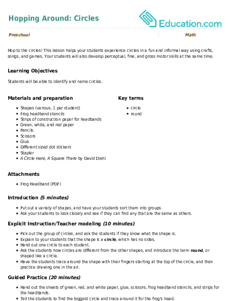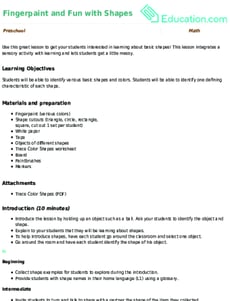Preschool Two-Dimensional Shapes Lesson Plans
About Preschool Two-dimensional Shapes Lesson Plans
On Education.com, preschool 2D shape lesson plans focus on hands-on activities and interactive worksheets that help young children identify and differentiate circles, squares, triangles, and rectangles. These resources use real-world objects, art projects, and tracing exercises to engage children in learning about shapes while developing fine motor skills and spatial awareness. Students explore sides, corners, and curves while having fun with creative play-based methods that make learning about shapes accessible and engaging.
To support early childhood education, Education.com offers printable shape worksheets, shape hunts, sensory bin ideas, and pattern block exercises. These materials provide educators and parents with ready-to-use resources that reinforce mathematical concepts through playful, educational activities. This comprehensive collection encourages children to observe, compare, and make connections between shapes in everyday environments, strengthening their foundational understanding of geometry.
Practicing with real-world objects and art-based activities, students improve hand-eye coordination while practicing shape recognition. Caregivers and teachers can use these lessons for structured classroom instruction or independent learning at home. By integrating exploration, creativity, and mathematical concepts, these resources help children build confidence and curiosity that support future math skills and spatial reasoning.
To support early childhood education, Education.com offers printable shape worksheets, shape hunts, sensory bin ideas, and pattern block exercises. These materials provide educators and parents with ready-to-use resources that reinforce mathematical concepts through playful, educational activities. This comprehensive collection encourages children to observe, compare, and make connections between shapes in everyday environments, strengthening their foundational understanding of geometry.
Practicing with real-world objects and art-based activities, students improve hand-eye coordination while practicing shape recognition. Caregivers and teachers can use these lessons for structured classroom instruction or independent learning at home. By integrating exploration, creativity, and mathematical concepts, these resources help children build confidence and curiosity that support future math skills and spatial reasoning.









